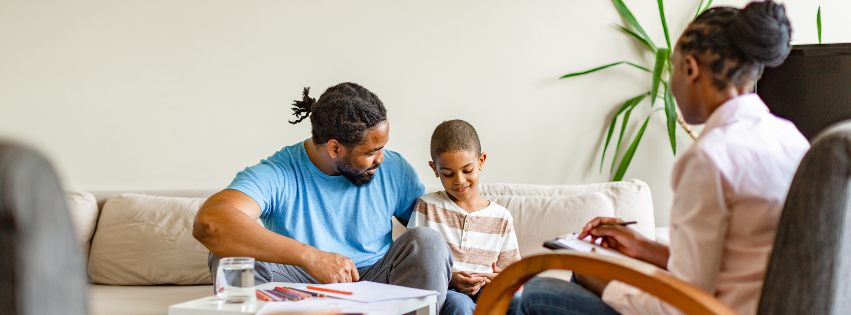Therapy for young children does not look like traditional talk therapy as most young children learn by doing. Typically play therapy will be used for young children which is a combination of playing games, art activities, movement and talking. Play therapy techniques will be used to help the child develop a warm, friendly connection with the therapist as well as help the child communicate their own needs. Our office has a variety of tools to create a safe space for play therapy including games, fidget toys, emotion activities, a dollhouse for learning and acting out social/family dynamics, and art materials.
Parent Involvement: How can I stay involved with my child’s therapy but also give them space with the therapist in session?
Parent involvement is strongly encouraged as we know it is an essential part of the child making progress outside of therapy. This allows for the therapist to check-in with the family to gain insight on weekly highs/lows, continued goal reviews, and for the parents to gain tools to use with the child outside of sessions. The parents and therapist will work together to talk about the level of involvement they prefer as we are flexible to ensure everyone is comfortable. Some parents will join either the first or last 10 minutes of the session, while others may want to stay a bit longer depending on the needs of the child. There is also an option to schedule a parent-only session with the therapist to discuss progress, answer questions, and anything else that may be easier to talk about without the child present.
Example of a child therapy session structure:
- Therapist greets child and parent in waiting room – child can pick out a game, art supplies, dollhouse, etc.
- Parent can check-in at either beginning or end of session.
- Ask child to identify how they are feeling and talk about the week.
- Play game or complete a therapeutic activity.
- Provide developmentally appropriate psychoeducation.
- Ask child if they need to take a break (i.e., stretch, say hi to parent, use bathroom).
- Practice a coping tool or calming skill.
- Review or summarize the session.
We also recognize that a child may lose attention or get tired, not being able to make it through the entire session. If this happens, the therapist can use the extra time to meet with the parent. Since each child’s needs are different, the therapist will structure the sessions in a way that is best for the child.



